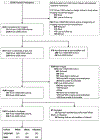Education differentially contributes to cognitive reserve across racial/ethnic groups
- PMID: 32827354
- PMCID: PMC8376080
- DOI: 10.1002/alz.12176
Education differentially contributes to cognitive reserve across racial/ethnic groups
Abstract
Introduction: We examined whether educational attainment differentially contributes to cognitive reserve (CR) across race/ethnicity.
Methods: A total of 1553 non-Hispanic Whites (Whites), non-Hispanic Blacks (Blacks), and Hispanics in the Washington Heights-Inwood Columbia Aging Project (WHICAP) completed structural magnetic resonance imaging. Mixture growth curve modeling was used to examine whether the effect of brain integrity indicators (hippocampal volume, cortical thickness, and white matter hyperintensity [WMH] volumes) on memory and language trajectories was modified by education across racial/ethnic groups.
Results: Higher educational attainment attenuated the negative impact of WMH burden on memory (β = -0.03; 99% CI: -0.071, -0.002) and language decline (β = -0.024; 99% CI:- 0.044, -0.004), as well as the impact of cortical thinning on level of language performance for Whites, but not for Blacks or Hispanics.
Discussion: Educational attainment does not contribute to CR similarly across racial/ethnic groups.
Keywords: cognitive aging; cognitive reserve; education; racial/ethnic differences.
© 2020 the Alzheimer's Association.
Conflict of interest statement
CONFLICTS OF INTEREST
The authors listed certify that they have no affiliations with or involvement in any organization or entity with any financial interest or non-financial interest in the subject matter or materials discussed in this manuscript.
Figures




References
-
- Knopman DS, Parisi JE, Salviati A, Floriach-Robert M, Boeve BF, Ivnik RJ. Neuropathology of cognitively normal elderly. J Neuropathol Exp Neurol. 2003;62:1087–1095. - PubMed
-
- Stern Y What is cognitive reserve? Theory and research application of the reserve concept. J Intl Neupsychol Soc. 2002;8:448–460. - PubMed

